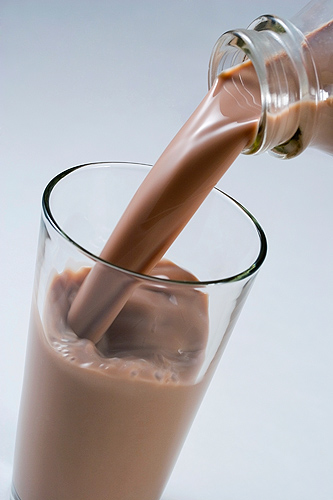
Chocolate milk – that favorite dietary staple of young children – is more than just a sweet treat. A recent study by researchers in the University of Connecticut’s Department of Nutritional Sciences has found that chocolate milk is also better than some other drinks at replenishing the body after exercise.
The study, undertaken in Professor Nancy R. Rodriguez’s lab, found that drinking a 16-ounce glass of fat-free chocolate milk after exercise gives the body essential proteins and carbohydrates that help refuel weary muscles better than a beverage containing carbohydrates alone.
Rodriguez, who has joint appointments in the departments of kinesiology and allied health and who serves as UConn’s director of sports nutrition, has been touting the benefits of milk in relation to athletic performance since the late 1990’s. But this is believed to be the first study of its kind showing a direct correlation between consuming chocolate milk and improved muscle recovery after prolonged exercise.
Dr. Jeffrey Anderson, UConn’s director of sports medicine, assisted in the research, as did three graduate students in nutritional sciences – William Lunn, Megan Colletto, and Kirstin Karfonta. The research team received national media attention when it announced its findings at the American College of Sports Medicine’s 57th Annual Meeting in Baltimore in June. The research is in the news again this week in recognition of Sept. 27 as National Chocolate Milk Day.
The study compared the performance of eight college-age male runners, who ran for 45 minutes on a treadmill at a moderate pace. After each run, the students drank either 16 ounces of fat-free chocolate milk or 16 ounces of a carbohydrate-only beverage made from concentrated Kool-Aid. Both drinks had the same number of calories. The researchers then took blood samples and muscle biopsies from the subjects during a three-hour recovery period. The results showed that those who drank chocolate milk had markers of increased muscle protein synthesis (rebuilding) in their body after exercise, when compared to those who drank the carbohydrate-laden beverage.
Additionally, the results showed that chocolate milk was as effective as the carbohydrate drink in replenishing the body’s stores of glycogen, a form of carbohydrate the body uses as fuel during intense or prolonged exercise. Rodriguez says the sugar from the chocolate syrup in the milk helps athletes replace depleted glycogen in their muscles to prepare them for their next workout.
“During recovery from strenuous exercise, it is extremely important to be able to replenish glycogen levels,” says Lunn, who conducted the research as part of his UConn doctoral dissertation and who is now an assistant professor of exercise science at Southern Connecticut State University. “Until recently, it was believed that you needed to eat just carbs to replace glycogen. But we found that chocolate milk, with both carbs and protein, is just as good as drinks loaded with carbohydrates when it comes to replacing glycogen.”
The research team found additional benefits of drinking chocolate milk in a secondary finding of the study. In that finding, the researchers had the same eight male runners run at their maximum speed on an inclined treadmill until they were too tired to continue, three hours after they consumed either low-fat chocolate milk or the carbohydrate beverage. The results showed that the individuals who drank the chocolate milk lasted significantly longer in the endurance test than those who drank the alternate beverage.
“We’re not saying chocolate milk is the only thing you should drink after exercise and nothing else works,” Lunn says. “What we’re saying is you definitely need both protein and carbohydrates after you exercise, and chocolate milk gives you the nutrients you need to help rebuild and replenish your muscles, which is important.”
Rodriguez says, “For the calories, chocolate milk not only provides good quality protein, but other essential nutrients and electrolytes, including calcium, sodium, and magnesium, that are beneficial to healthy, active men and women.”
In recognition of the benefits of proteins for muscle recovery, some sport drink manufacturers recently expanded their product lines to include sports drinks infused with higher levels of proteins to help expedite recovery from exercise.
The study was funded by the National Dairy Council and the National Fluid Milk Processor Promotion Board. The research is being submitted for publication in the journal Medicine & Science in Sports & Exercise this fall.


